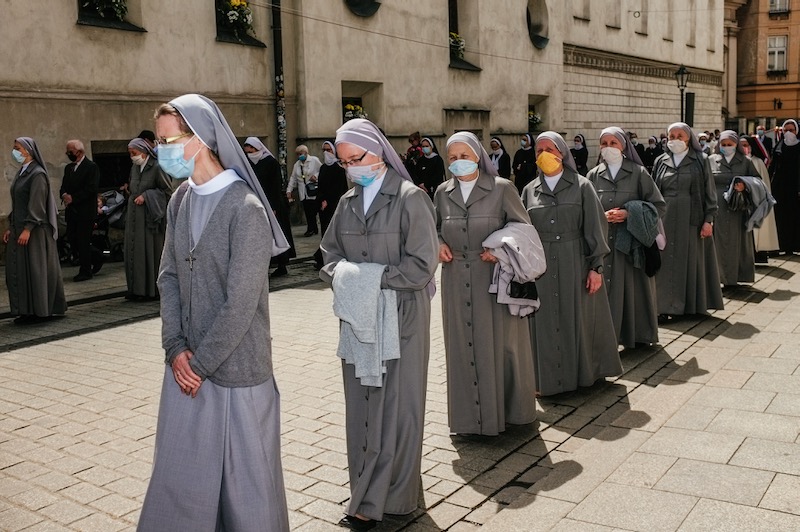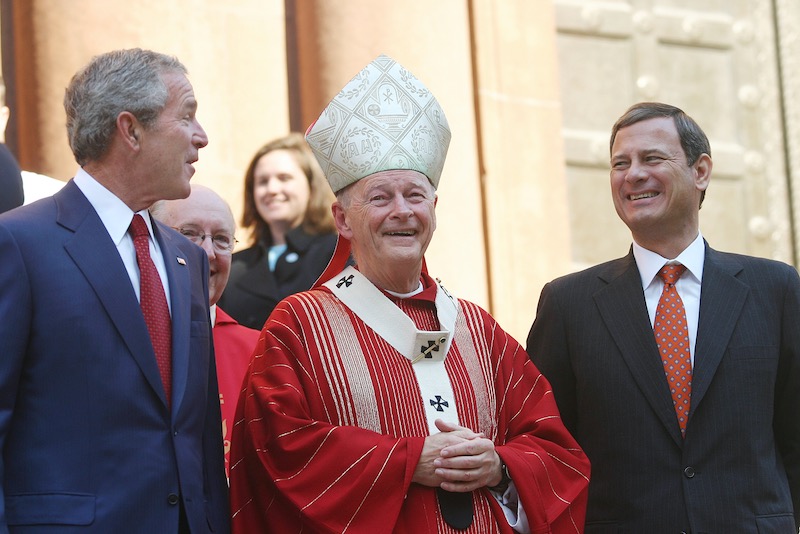The Holy See’s long-awaited report into ex-Cardinal Theodore McCarrick is a first in many ways. Not least, it is the first institutional examination of conscience by the Vatican of its handling of a high profile abuse case to be made public. Few involved, including the current Pope and his two predecessors, emerge from the story with their reputations enhanced.
What makes the document unprecedented is its willingness to confront the mistake that was made by a pope and now saint, John Paul II, in appointing Theodore McCarrick as Archbishop of Washington DC in 2000, and a cardinal the following year. Pope John Paul took the decision despite being aware of sexual misconduct allegations made against McCarrick. But he did so, the report explains, due to inadequate information supplied by some US bishops, suspicions about the truth of the allegations, and John Paul’s years of working directly with McCarrick.
At the time of his Washington appointment, no victim of McCarrick had come forward to the Holy See. It was not until almost two decades later that an allegation that McCarrick had abused a minor would be deemed credible, leading to his removal from the College of Cardinals by Pope Francis. Soon afterwards, after a Church trial found him guilty of abusing minors and adults, he was dismissed from the priesthood.
The report, commissioned by Pope Francis in September 2018, includes striking revelations about Archbishop Carlo Maria Viganò, the former papal ambassador to the United States. According to its findings, in 2012, a year before Pope Benedict XVI’s resignation, Viganò ignored specific instructions from his Vatican superiors to investigate an allegation of sexual misconduct against McCarrick. The detail is jaw-dropping, given it was Viganò who in August 2018 took the extraordinary step of issuing a dossier alleging that Francis had mishandled the McCarrick case and calling on him to resign. The decision to launch an investigation into the McCarrick case and to make it public was made by the Pope in the wake of Viganò’s allegations.
In stark and forensic detail the McCarrick report lays bare the weaknesses in the Vatican’s system for appointing bishops during the final years of the John Paul II era, exposing a systematic failure by high ranking ecclesial officials to respond adequately to credible allegations of sexual misconduct against one of their own.
The Report on the Holy See’s institutional knowledge and decision-making related to former Cardinal Theodore Edgar McCarrick was produced by the Holy See’s Secretariat of State. It is an exhaustive 449-page document, with 1,412 footnotes. It includes interviews with over ninety witnesses and cites documents found after a trawl through the archives of the most powerful offices of the Roman Curia. Cardinals, bishops and current and former officials were interviewed about what they knew about McCarrick’s rise up the clerical ranks. The report does not seek to justify the mistakes that were made, but it does try to explain why certain decisions were taken within the context of the time.
Theodore McCarrick, the report explains, was promoted to the position of Archbishop of Washington DC in 2000 by John Paul II. At that time the Vatican was aware that McCarrick had been accused of sharing his bed with adult seminarians. A priest had also accused McCarrick of trying to engage him in sexual activity. In the early 1990s, anonymous letters accusing McCarrick of paedophilia had also been sent to the cardinals in the United States, the bishops’ conference and the apostolic nuncio. According to the report, these claims were not forwarded to Rome.
Given the rumours swirling around McCarrick, Pope John Paul had earlier decided not to promote the then Archbishop of Newark, New Jersey, on three occasions, believing it would have been “imprudent”. When the Washington DC vacancy came up, Cardinal John O’Connor, then the Archbishop of New York, summarised the allegations against McCarrick in a 1999 letter which was shared with the Pope.
But then the Pope change his mind.
John Paul commissioned a secret inquiry into McCarrick via the apostolic nuncio at the time, Archbishop Gabriel Montalvo. According to the report this turned out to be inadequate because three US bishops provided “inaccurate and incomplete information”. McCarrick vigorously protested his innocence, while the priest accuser of McCarrick was deemed unreliable because he himself was the abuser of two teenage boys. The Newark archbishop was viewed as “hard-working and effective”. All these factors conspired to get McCarrick the nomination.
The report points to another factor in the puzzle of what led John Paul to over-ride the concerns being expressed about McCarrick. It suggests that John Paul may have been influenced by his experience as an Archbishop in Poland, when the communist regime often tried to discredit the Church by circulating false accusations against priests. And John Paul had known McCarrick for decades, first meeting him before his election as Pope, when Fr McCarrick was the personal secretary of Cardinal Terence Cooke. “McCarrick’s direct relationship with John Paul II also likely had an impact on the Pope’s decision making,” the report states.
Later, during the Pope Benedict era, new details about McCarrick’s behaviour emerged which led to Benedict forcing the Archbishop of Washington to resign “spontaneously” in 2006. At this time, Archbishop Viganò was working in the Secretariat of State and he highlighted the allegations made against McCarrick. Following McCarrick’s retirement, it was recommended to Pope Benedict that he open a Church inquiry. But Benedict declined and opted instead to “appeal to McCarrick’s conscience”, indicating to him that he “should maintain a lower profile and minimise travel for the good of the Church.” These were essentially informal “indications” communicated to McCarrick by Cardinal Giovanni Battista Re, who was then in charge of the Vatican’s Congregation for Bishops.
In his 2018 dossier against Francis, Viganò claimed that after he succeeded Benedict, Pope Francis had ignored formal “canonical sanctions” that had been placed on McCarrick, and rehabilitated him as a trusted adviser. The McCarrick report shows these allegations to be false. There were no formal sanctions on McCarrick. “No one … provided Pope Francis with any documentation regarding allegations against McCarrick,” the report claims. By the time the Jesuit Pope took office McCarrick was over 80 and past the retirement age of a cardinal.
The report says that given that the allegations and rumours concerned immoral conduct with adults from several years previously, which McCarrick had always strenuously denied, Francis “did not see the need to alter the approach that had been adopted in prior years.” No doubt Pope Francis now wishes he had paid more attention to the case. The report also says that the Argentine Pope never gave McCarrick any role as an adviser.
In 2012, however, Cardinal Marc Ouellet, then Prefect of the Congregation for Bishops, was informed by Viganò of a new allegation of sexual misconduct against McCarrick. Cardinal Ouellet explained what action should be taken “but Viganò did not take these steps”, according to the report. Furthermore, McCarrick remained active in spite of Benedict’s instructions and the report explains that “McCarrick kept Viganò regularly informed of his travels and activities.” Yet Viganò remained inert.
McCarrick had been one of the most influential figures in the United States Church. He was a networker with an array of political contacts, a globe trotter, fundraiser extraordinaire and he was close to the centres of power in both the Vatican and Washington DC. But while his fundraising and gift-giving are acknowledged, the report concludes they were “not determinative” in the decision-making process that took McCarrick to the top of the US hierarchy.
For decades McCarrick was regarded as a hard-working, pastoral and intelligent church leader. He had first been appointed an auxiliary bishop in 1977 by Paul VI and then John Paul II chose him as Bishop of Metuchen and then Archbishop of Newark in the 1980s.
This report will be read in different ways by the different factions in the Church in the US and elsewhere. It has been a painful lesson-learning exercise. Many of the recent reforms Pope Francis has implemented to combat abuse can be linked back to the McCarrick case. In 2019, Francis widened the definition of abuse to include sexual misconduct involving adults and those in positions of power, and in a recently published handbook on handing abuse allegations the Vatican informed bishops not to ignore anonymous allegations made by third parties. Pontifical secrecy for abuse cases has also been abolished.
Fundamental reform in the way bishops are appointed, so that candidates can be robustly assessed, and lay people given more of a say is still required. The abuse crisis has exposed deep failures in the systems of clerical governance and highlighted the need to reform both processes and culture. Francis has been taking modest steps in the right direction. When the Pope two years ago announced a “thorough study” of what the Holy See knew about McCarrick he pledged to “follow the path of truth wherever it may lead.” The report still leaves some unanswered questions, but it is an attempt to walk down that path and is a long-overdue step towards the greater transparency that both survivors of abuse, and ordinary Catholics, have repeatedly called for. It is another sign that the Church is, painfully and sometimes grudgingly, putting the years of cover-ups, denial and secrecy behind it, and trying to face up to reality.
Francis’ medicine for the abuse crisis is simple. It can be found in a dozen words from John’s Gospel: “You will know the truth, and the truth will make you free.”



 Loading ...
Loading ...